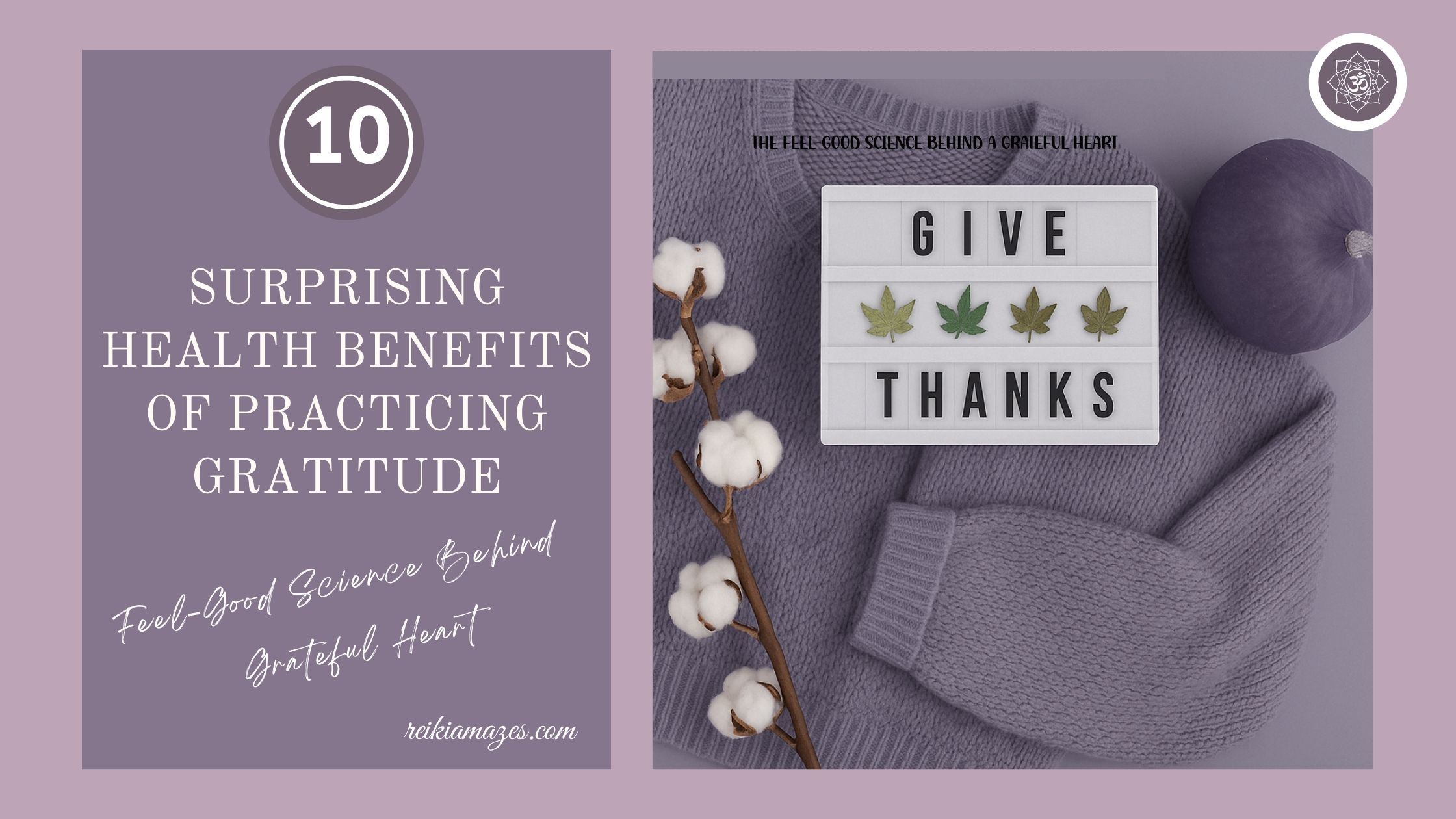Have you ever noticed how some people seem to radiate positivity even during challenging times? What if I told you their secret might be as simple as saying “thank you” more often?
In our fast-paced world where we’re constantly chasing the next goal, we rarely pause to appreciate what we already have. Yet science shows that this simple act of gratitude can dramatically transform both our mental and physical wellbeing.
This guide will walk you through the surprising health benefits of practicing gratitude and show you exactly how to incorporate this powerful habit into your daily life.
What is Gratitude Practice?
Gratitude practice is the intentional act of acknowledging and appreciating the positive aspects of life—both big and small. It’s more than just saying “thanks” when someone holds the door.
It’s a mindset that recognizes the value in our experiences, relationships, and even our challenges. Gratitude practice can take many forms, from keeping a journal to simply pausing for a moment of reflection each day.
Why Gratitude Matters for Your Health
The science behind gratitude is compelling—researchers have found that regularly practicing gratitude doesn’t just improve your mood; it actually creates measurable changes in your brain and body. Studies from institutions like Harvard Medical School and UC Davis have documented significant improvements in both psychological and physical health among people who practice gratitude consistently.
Recommended Read: Step-by-Step Beginner Guide to Gratitude
10 Surprising Health Benefits of Practicing Gratitude
1. Boosts Your Immune System
Would you believe that saying “thank you” could help you fight off the common cold? Research suggests that grateful people experience fewer aches and pains and report feeling healthier than others. The positive emotions associated with gratitude trigger the release of health-boosting neurochemicals that strengthen your immune response. So next time you’re washing your hands to avoid getting sick, try adding a dose of gratitude to your preventative routine!
2. Improves Sleep Quality
Tossing and turning at night? Gratitude might be the sleep aid you’ve been looking for! Studies show that spending just 15 minutes jotting down grateful thoughts before bed can help you fall asleep faster and enjoy deeper, more restful sleep. Instead of counting sheep, try counting blessings—your body will thank you with those precious extra minutes of quality sleep.
3. Reduces Stress and Anxiety
In our anxiety-ridden world, gratitude works like a natural anti-anxiety medication (without the side effects!). When you feel thankful, your body decreases production of cortisol (the stress hormone) by up to 23%, according to researchers at UC Davis. The next time you feel your shoulders tensing up, try this experiment: name three things you’re grateful for right now. Feel that? That’s your body physically releasing tension!
4. Enhances Heart Health
Your heart loves gratitude—literally! Regular gratitude practice has been linked to reduced inflammation markers and improved heart rhythm. One study found that patients with heart failure who kept gratitude journals showed reduced inflammation and improved heart rate variability after just 8 weeks. Who knew “heartfelt thanks” could be so scientifically accurate?
5. Creates More Meaningful Relationships
Gratitude is like relationship super-glue! When you express appreciation to the people in your life, it strengthens your bonds and encourages reciprocity. Research shows that couples who regularly express gratitude to each other report higher relationship satisfaction and feel more comfortable discussing concerns. So that “thank you” for taking out the trash might be more powerful than you think!
6. Increases Mental Resilience
Think of gratitude as emotional weight training for your mind. Regular practice builds your psychological muscles, making you more resilient when facing life’s inevitable challenges. A study published in the Journal of Personality and Social Psychology found that grateful people recover more quickly from trauma and setbacks because they’re able to find silver linings and growth opportunities even in difficult situations. Your gratitude practice today becomes your emotional strength reserve for tomorrow!
7. Reduces Symptoms of Depression
Gratitude acts as a natural antidepressant by increasing dopamine and serotonin levels in the brain—similar to how many antidepressant medications work. Research in Clinical Psychology Review found that writing gratitude letters produced significant mental health benefits that lasted for months, even if the letters were never sent! It seems the act of acknowledging goodness in your life helps crowd out negative emotions.
8. Lowers Blood Pressure
Need to bring those blood pressure numbers down? A study in the Journal of Health Psychology has shown that gratitude practice can reduce blood pressure by several points in hypertensive patients. The calming effect of gratitude triggers your parasympathetic nervous system (your body’s “rest and digest” mode), allowing your blood vessels to relax. Your cardiologist might not prescribe it yet, but your gratitude journal could become an important part of your heart-healthy routine!
9. Decreases Physical Pain
Chronic pain sufferers, take note! Research published in the Journal of Behavioral Medicine has linked gratitude practice to reduced pain intensity and increased pain tolerance. When you focus on what you’re thankful for, your brain releases natural painkillers that can help manage discomfort. While it won’t replace medical treatment, adding gratitude to your pain management toolkit could help you need less medication over time.
10. Increases Overall Happiness and Life Satisfaction
Perhaps most remarkably, gratitude is one of the few things that can measurably increase your baseline happiness level. While humans tend to adapt to both positive and negative life changes (returning to a happiness “set point”), research by Dr. Robert Emmons shows that regular gratitude practice actually shifts that set point upward over time. It’s like permanently adjusting your happiness thermostat by a few degrees!
How to Develop a Gratitude Practice
Step 1: Start a Gratitude Journal
Begin by setting aside just 5 minutes each day to write down 3-5 things you’re grateful for. Don’t worry about being profound—your morning coffee, a good parking spot, or a text from a friend all count! The key is consistency rather than length or depth. Pro tip: Do this either first thing in the morning to set a positive tone for your day, or before bed to improve your sleep, as recommended by positive psychology researchers.
Step 2: Practice Mindful Appreciation
Transform everyday moments into gratitude opportunities by fully engaging your senses. When eating, really taste and appreciate your food. While walking outside, notice the feel of sunshine or the sound of birds. Studies on mindfulness and gratitude show these micro-moments of appreciation train your brain to naturally scan for positives throughout your day. Think of it as gratitude push-ups for your mind—small exercises that build strength over time!
Step 3: Express Your Gratitude to Others
Take your gratitude beyond your journal by expressing it directly to others. Write a handwritten thank-you note, send a voice message of appreciation, or simply tell someone how much you value them. Research from the University of Pennsylvania shows that expressing gratitude creates a positive feedback loop—both the giver and receiver experience mood boosts. It’s the rare gift that multiplies when you give it away!
Step 4: Create Gratitude Rituals
Incorporate gratitude into existing routines to make it stick. Try sharing three grateful moments during family dinners, starting team meetings with appreciation rounds, or pausing before meals to express thanks. Habit formation research confirms these rituals act as “gratitude anchors” throughout your day, ensuring that thankfulness becomes a habit rather than an occasional practice.
Step 5: Reframe Challenges Through Gratitude
The most powerful form of gratitude may be finding something to appreciate in difficult situations. When facing challenges, ask yourself: “What might this be teaching me?” or “What strength am I developing through this?” This isn’t about toxic positivity or denying difficulties—it’s about finding meaning and growth even in struggles. Research on post-traumatic growth confirms that the ability to be grateful during tough times is the ultimate resilience superpower!
Additional Enhancements
- Gratitude Visualization: Spend 2 minutes imagining how your life would be different without something you currently have—then feel the wave of appreciation when you “return” to your current reality. This mental subtraction approach has been shown to significantly boost happiness.
- Gratitude Jar: Write down moments of gratitude on small papers and collect them in a jar. On tough days, pull one out as an instant mood lifter, a practice supported by positive psychology interventions.
- Gratitude Buddy: Partner with a friend to share daily gratitude texts, creating accountability and doubling your positive exchanges, a technique recommended by social support research.
Common Mistakes to Avoid
- Being Too General: “I’m grateful for my family” is nice, but “I’m grateful for how my sister listened to me for an hour yesterday” has more emotional impact, according to gratitude researchers.
- Forcing Positivity: True gratitude acknowledges challenges while finding genuine bright spots—it’s not about pretending everything is perfect, as cautioned by mental health experts.
- Comparing Your Gratitude: Your meaningful moments don’t need to be Instagram-worthy—small, personal appreciations are just as valuable.
- Starting Too Big: Begin with just 3 items daily rather than overwhelming yourself with lengthy lists that become a chore, as advised by gratitude pioneer Robert Emmons.
Troubleshooting and Common Questions
“I can’t think of anything to be grateful for today.”
Start with basics—did you have clean water? A roof over your head? Did your body function? Research on mindful gratitude shows that sometimes beginning with fundamental necessities reminds us of how much we take for granted.
“I feel silly writing the same things repeatedly.”
Try getting more specific. Instead of “my spouse,” try “the way my spouse remembered to bring home my favorite snack today.” Studies on gratitude journaling confirm that specificity creates fresh emotional connections.
“I don’t have time for another daily practice.”
Piggyback on existing habits—express gratitude while brushing your teeth, during your commute, or waiting for coffee to brew. Habit stacking research confirms that even 30 seconds of focused appreciation counts!
Conclusion and Your Action Plan
The science is clear: gratitude isn’t just a nice sentiment—it’s a powerful health intervention that can transform your physical wellbeing, emotional resilience, and quality of relationships. The beauty is that unlike many health practices, gratitude requires no special equipment, doesn’t cost anything, and can be done anywhere.
? Destiny Designers, your most powerful transformation tool might be hiding in plain sight! The simple act of appreciation can literally rewire your brain and body for greater health and happiness. Which of these 10 health benefits surprised you the most?
Drop a comment below and let us know which gratitude practice you’ll be trying first! Don’t forget to save this post for those days when you need a reminder of the power of thankfulness, and share it with friends who could use a health boost. We’re all in this journey together, designing our destiny one moment of gratitude at a time. ?
















